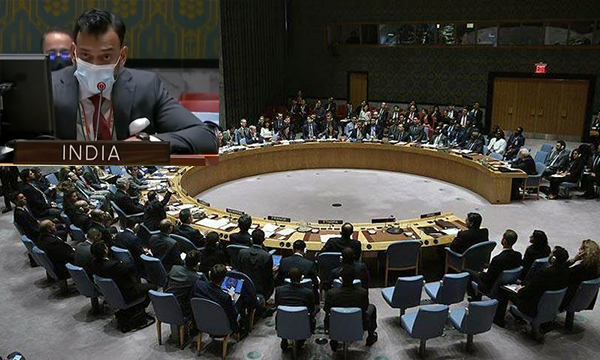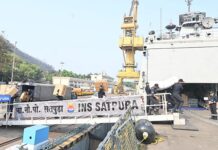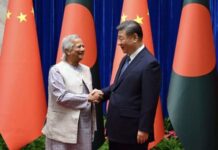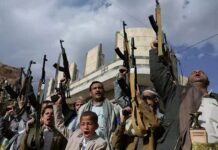
India Slams Pakistan in UN Security Council
India said in a UN Security Council (UNSC) debate, on 25 January, that member states are fully aware that Pakistan has a long history of harbouring, helping, and actively supporting terrorists during a UNSC debate on “Protection of civilians in armed conflict.” Underscoring the threat of terrorism to civilians, Counsellor in India’s Permanent Mission to the UN, R Madhu Sudan said that the perpetrators of the 2008 Mumbai terror attack continue to have Pakistan’s support.
The Indian Counsellor made these remarks after a Pakistani diplomat misused the platform provided by the UN to “propagate false and malicious propaganda” against India. “This is not the first time that a Pakistani representative has used a UN platform to spread false and malicious propaganda against my country, attempting in vain to divert the world’s attention away from the sad state of his country where terrorists have free reign and the lives of ordinary people, particularly minorities, are turned upside down,” he said.
“This is a country that has been identified as a global terrorist sponsor and holds the world record for hosting the most terrorists sanctioned by the Security Council.” So much so that today’s terrorist attacks all around the world have their origins in Pakistan in some way or another,” he claimed.
Madhu Sudan reminded the Security Council that Pakistan’s prime minister and foreign minister had been chastised for aiding terrorists such as Osama Bin Laden, but they continue on their merry way.
“Today, we’re talking about civilian protection. Terrorists pose the greatest threat to civilians. As we previously stated, the perpetrators of the 2008 Mumbai terror incident continue to enjoy the support of the state she represents,” he continued.
The Indian Counsellor reaffirmed that “the entire Jammu and Kashmir and Ladakh were, are, and always will be an integral and inalienable part of India, irrespective of what Pakistan representation feels… We call upon Pakistan to promptly quit all regions under its unlawful occupation.
“Madhu Sudan stated that India wishes to have normal and friendly ties with all countries, including Pakistan, and that it is committed to amicably resolving any unresolved concerns, as per the Shimla Agreement and the Lahore Declaration.
“However, any genuine debate can only take place in a free of terror, animosity, and violence environment. Pakistan is responsible for creating such an environment. India would continue to take robust and decisive action until then.
On the issue of Jammu and Kashmir and Ladakh, Madhu Sudan reiterated that the entire J&K and Ladakh were, are and will always be an integral and inalienable part of India, irrespective of what Pakistan representative believes. “We call upon Pakistan to immediately vacate all areas under its illegal occupation,” the Indian Counsellor said. .
“However, any meaningful dialogue can only be held in an atmosphere free of terror, hostility and violence. The onus is on Pakistan to create such a conducive atmosphere. Till then, India will continue to take firm and decisive steps to respond to cross border terrorism,” he added.
No Common Definition of Terrorism
The United Nations member states have failed themselves by continuing to procrastinate on concluding a comprehensive convention against international terrorism, India has said, voicing concern that the global body has neither agreed on a common definition of terrorism nor crafted a well-coordinated policy to tackle the global scourge and dismantle its enabling networks.
Speaking in the UNGA meeting to consider the Report of Secretary-General on the work of the Organisation, Second Secretary in India’s Permanent Mission to the UN Dinesh Setia, on 24 January, said: “Our inability to seriously address terrorism, the most dangerous of scourges faced by states and societies since the World War II, casts doubt on the relevance of the organisation for the very people whom the Charter of the United Nations obliges us to protect”.
“The United Nations has yet to agree on a common definition, let alone craft a coherent well-coordinated policy to tackle terrorism and dismantle its enabling networks. We have failed ourselves by continuing to procrastinate on concluding a comprehensive convention against international terrorism,” he said.
India proposed a draft document on the Comprehensive Convention on International Terrorism (CCIT) at the UN in 1986 but it has not been implemented yet as there is no unanimity on the definition of terrorism among the member states.
The Indian diplomat further said that the effectiveness, relevance and longevity of any institution lie in its dynamic character and ability to adapt itself to the changing times.
“As long as the key organs of the organisation remain anchored in a governance structure frozen in the past, the crisis of legitimacy and performance will persist,” Setia said.
Lamenting that four decades have gone by since the inscription of the item on the reform of the Security Council on the agenda of the General Assembly, Setia called on member states to strive to ensure that this year is the one that finally delivers some concrete progress with regard to a Security Council and a United Nations that reflect the realities of the contemporary world.

















